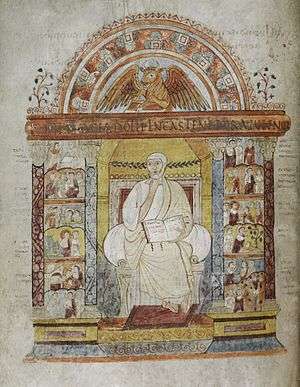Coelius Sedulius
Sedulius (sometimes with the nomen Coelius or Caelius, both of doubtful authenticity)[1] was a Christian poet of the first half of the 5th century.

Biography
Extremely little is known about his life. Sedulius is the Latin form of the Irish name Siadhal, referring to the a family, sept or "siadhal" meaning "seed." [2]The only trustworthy information is given by his two letters to Macedonius, from which we learn that he devoted his early life, perhaps as a teacher of rhetoric, to secular literature. Late in life he converted to Christianity, or, if a Christian before, began to take his faith more seriously.[3] One medieval commentary states that he resided in Italy.[1] He is termed a presbyter by Isidore of Seville and in the Gelasian decree.
Works
His fame rests mainly upon a long poem, Carmen paschale, based on the four gospels. In style a bombastic imitator of Virgil, he shows, nevertheless, a certain freedom in the handling of the Biblical story, and the poem soon became a quarry for the minor poets. His description of the Four Evangelists in Carmen Paschale became well-known; the English translation below is from Springer (2013, p. 21).
Hoc Matthaeus agens hominem generaliter implet; |
Matthew plays the role of the whole human race; |
His other writings include an Abecedarian hymn in honour of Christ, A solis ortus cardine, consisting of twenty-three quatrains of iambic dimeters. This poem has partly passed into the liturgy, the first seven quatrains forming the Christmas hymn "A solis ortus cardine";[4] and the Epiphany hymn, "Hostis Herodes impie." A "Veteris et novi Testamenti collatio" in elegiac couplets has also come down, but we have no grounds for ascribing to him the Virgilian cento, "De verbi incarnatione."
Editions
- Faustino Arévalo (Rome, 1794), reprinted in Jacques Paul Migne's Patrologia Latina vol. xix.
- Johann Huemer (Vienna, 1885).
- Victoria Panagl (Bearb.), Sedulius, Opera Omnia, Ex Recensione Iohannis Huemer (Corpus Scriptorum Ecclesiasticorum Latinorum, 10), Wien, 2007, XLVII, 532 S.
- Springer, Carl P. (2013), Sedulius, The Paschal Song and Hymns, Ancient Israel and Its Literature, 35, SBL Press, ISBN 978-1589837447
Further reading
- Roger P H Green, Latin Epics of the New Testament: Juvencus, Sedulius, Arator, Oxford UP 2008 ISBN 978-0-19-928457-3 (reviewed by Teresa Morgan in the article "Poets for Jesus", Times Literary Supplement 4 April 2008 p 31).
References
- Paul Lejay (1913). . In Herbermann, Charles (ed.). Catholic Encyclopedia. New York: Robert Appleton Company.
- http://www.libraryireland.com/names/men/siadhal-siaghal-shiel.php. Missing or empty
|title=(help) - "Biography of Sedulius (5th century poet) at Christian Classics Ethereal Library". Archived from the original on 2015-09-24. Retrieved 2011-03-05.
- This incipit was borrowed for the Carolingian Planctus de obitu Karoli; see Peter Godman (1985), Latin Poetry of the Carolingian Renaissance (Norman: University of Oklahoma Press), 206–211.

- Johann Huemer, De Sedulii poetae vita et scriptis commentatio (Vienna, 1878)
- Max Manitius, Geschichte der christlich-lateinischen Poesie (Stuttgart, 1891)
- Teuffel-Schwabe, History of Roman Literature (Eng. trans.), 473
- Herzog-Hauck, Realencyklopädie für protestantische Theologie, xviii. (Leipzig, 1906)
- Smith and Wace, Dictionary of Christian Biography (1887)
External links
| Wikisource has original works written by or about: Coelius Sedulius |